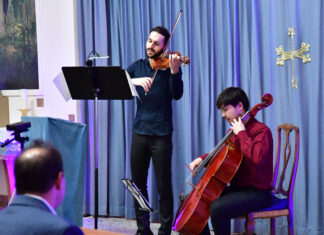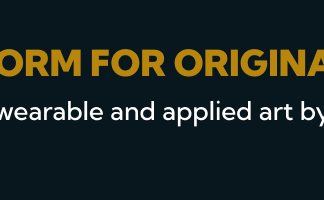A unique pocket-sized sliver of a book, #jivjiiv provides evidence that Western Armenian may be experiencing a renaissance of sorts. This compendium of Twitter poems penned by poet and linguist Hrayr Varaz, then posted by him on Instagram was composed starting in October, 2020 during the 44-day attack on Artsakh. As a rule on Twitter, each tweet must be 280 characters or shorter, with every letter, number, symbol, space one character long (emojis and some complex punctuations count as two characters.)
A graduate of UCLA’s Chamlian and Holy Martyrs Ferrahian Day Schools (both his parents attended Jemaran in Beirut), Varaz is a shining example of why donors should continue to support Armenian schools and expand on the current limited number of these institutions in America: “I consider myself an ideal product of the Western Armenian community. I went to Armenian school full-time and got used to typing Armenian in high school thanks to my classmate Ara Kazandjian, who put me in charge of the Armenian submissions for the school’s literary magazine.“ Varaz also took Armenian courses as a UCLA undergrad; later on at MIT he studied patterns which occur across languages, as they relate to Western Armenian. A first example of the touching and sometimes humorous poems included in #jijiv:
“ln the pool of love around you/hearts unload, cleanse, replenish.”
A certain amount of joy in creating is evident throughout the volume — it’s entertaining rather than serious, colloquial rather than literary: “Part of the fun is innovating by expanding, adding, crushing, squeezing, forming the current language as if it were clay and I were creating unique ceramic pieces. I am disappointed that Western Armenian got slapped with the endangered label by UNESCO, but I think it helped jolt some people to action.”
The first volume of #jivjiv — a second volume is soon to be in the offing — includes 29 pieces divided into four broad categories: Armenian culture, Armenian language, Night sky, Queer. Topics include Armenian food and holidays, specific people, coffee-cup readings.
The true genesis of the book lies in Varaz’s desire to demystify Western Armenian for learners of all ages, who are sometimes afraid of making mistakes to the extent of being unable to form even basic sentences, something referred to in the linguistic parlance a xenoglossophobia: “I wanted there to exist a Western Armenian book that showed the written form as it came out of the writer, before the spellcheck/revision process. I wanted an Armenian book with spelling mistakes, to encourage others to write and not worry about spelling as they create,” explains Varaz: “I found that creation for me required putting aside the worry and shame of spelling mistakes and the ‘correct form’ of a word. I allowed my language to flow and write freely. This is why at the bottom of every page of my book I put ‘written with spelling freedoms’ (ուղղագրական ազատութիւններով գրված – ughakragan azadutyunnerov kervadz).’”








